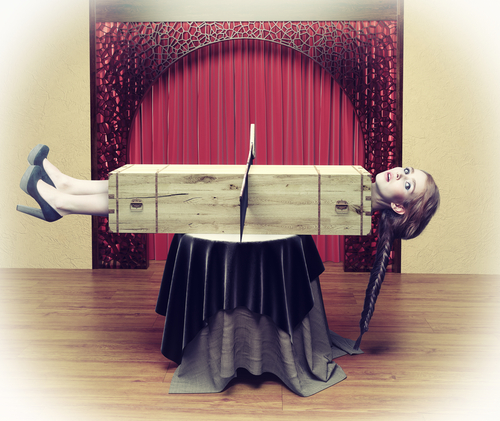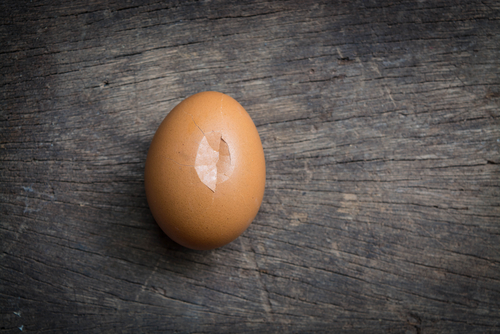
Tuesday: Post Office, then Boardman’s for a large white loaf and four slices of ox-tongue. Pay for the papers, one quarter pound of boiled sweets – nothing liquorice. Then the chippy: two small fish, two peas, one large chips. Home by 12.15, kettle on, bread buttered.
‘How’s your fish?’
‘It’s all batter; half of it’s empty. Look!’ Derek pushes his knife under the batter and shows me the absence of cod.
‘Do you want to swop?’ I say. ‘This one’s alright.’
‘No, it’ll do. Besides, you’ve eaten more than I have. Any more tea in that pot?’
He falls asleep in the chair after dinner. His mouth drops open and his false set clicks against his palate as he breathes in and out. He has had that cardigan for seventeen years and the blasted thing still hasn’t worn out.
I wash up slowly, taking longer in the kitchen than I need to, staring out from the window at the flaking whitewash on the backyard walls. The flakes make patterns, sometimes I can see faces. It might be just the light but, sometimes, I can see a Japanese woman, with high-piled hair and odd, flat features.
The crossword, the word search and then a short look through the paper. More asylum seekers, some arguments over energy prices and the world’s tallest dog. Free quotes for a stair-lift and impossibly glamorous living in a new retirement village. The clicking stops as Derek wakes up. ‘Must have needed it. Shall we have a brew? No, you sit down. I’ll make it.’
‘There’s a bit of that cake, if you fancy it: the lemon one.’
There’s the banging of cupboard doors before he shouts from the kitchen, ‘Where the ruddy hell ‘ave you hidden it?’
I shoo him out of the way. Cut two slick slices of cake and rinse the knife at the sink. ‘Hello,’ I whisper. ‘Hello my little Tokyo friend.’
There’s a quiz show. Sausage and egg for tea. Then I phone our Carole and remind her about Paul’s birthday. I don’t say anything to Carole about the tests he’s been going for. Later I fall asleep during Holby, wake up and complain about the gas fire. I sit on the side of the bed and rub Atrixo into my hands, read three pages, turn out the light and listen to the heating pipes contracting.
Wednesday: Upstairs: bedroom, back bedroom. Bleach down the loo. Empty the Hoover bag, dust down the stairs. Butchers: four small cutlets – daylight bloody robbery – and half a pound of lamb’s liver. New potatoes – Cheshire earlies – should be lovely. Call and pick up Derek’s prescription.
The sun comes out. I walk rather than getting the bus. It’s only three or four stops anyway, and I don’t know why I don’t always do it. I get talking to Hilda who’s out with that stupid dog of hers. Have to listen for twenty minutes about Australia and her Kenneth and how she’s going again next year, and how travel broadens the mind. Broadens the arse more like. How many seats on the plane did they make her pay for?
Tongue with a little mustard. A tomato on the side, sliced with pepper and a splash – just a splash, mind – of vinegar. Scrub the spuds for later. I decide to sort that drawer full of photographs and to write some names on the backs while I can still remember who’s who. Derek gets cross because he’s trying to read the paper and I keep making him lose his place. ‘Where was this Derek? Was it Bridlington or Scarborough?’
I peg out a few bits later – they might dry, you never know – and look for my Japanese lady, but the light or the angle is wrong. I can see a dog. A large curling flake casts its own round shadow.
Cutlets, boiled potatoes and peas, with a small glass of wine: the left-overs from Sunday. Well, I can’t tell the difference and it’s a shame to throw it down the sink. Nowt on the telly.
Thursday: Put the towels on a hot wash. Catch the ten-past-ten and meet Margaret for a latte and a toasted teacake. Remember the good old days when we could order a coffee and not have to give it some fancy foreign name. Have a quick look round the shops. Almost buy Derek a new cardigan: I stand in the queue at the cash desk until I feel like swearing and walk out of the shop, leaving the cardigan hanging on a rack of superhero pyjamas.
Walk past the travel agents on the way to the bus station. Go inside and get pounced on by a skinny girl in stupid shoes with false eyelashes – the girl that is, not the shoes. Get a brochure of coach trips in Yorkshire, when what I really wanted was the one for tours to the Far East. Leave the brochure on the bus in case it gives Derek ideas.
Run out of toilet roll. Put a box of tissues in the bathroom. Leave Derek to fathom it for himself. He starts talking about newspaper and the outside loo we had when we first got wed, and I fall asleep because it saves having to listen.
Friday: Big shop. Derek drives me in the Civic, drops me by the door and then drives to the far, quiet end of the car park, where “no bugger’s going to scratch my paintwork with a trolley”. Load up on loo roll, tea, Jaffa cakes, Shredded Wheat, spuds and tin foil. Try and work out if the three for two is worth it. A bunch of lilies with fat green pods, and then a quick wander around the magazines for a Woman’s Own and a Real Travel magazine. Pay using Derek’s bank card – mine doesn’t work for some reason and tuck the holiday mag firmly inside the Woman’s Own. Call Derek on the mobile and get him to drive 100 yards to pick me up because the trolley’s got a wonky wheel.
Cheating bought quiche and a bag of salad; cream horns for afters – lovely!
Call Paul about his test results. Curse the NHS and then admit that it’s marvellous really and we shouldn’t complain. Send my love to Matty and Lottie. Ask when they are coming for tea.
Iron the towels and put them away. Hide the holiday mag at the back of the airing cupboard until Derek’s gone down to the club – he borrows a twenty out of my purse, but it’s worth it for the peace and quiet. Watch three episodes of Escape to the Country back to back. The Sky box keeps recording them – I’m sure I never set that up.
Wake up with Derek breathing beer in my face and turn over. He follows me as I move across the mattress and I end up teetering on the edge half the night.
Saturday: Bring two mugs of tea back to bed. Leave Derek asleep and then get cross because he’s let his tea get cold. The boiler sounds funny. Wonder which costs more: a new boiler or a trip to Mount Fuji? Breakfast before getting dressed: shredded wheat with warm milk, half a slice of toast, two cod-liver oils, because I can’t remember if I’ve had one or not. Water the houseplants with a too small, but very pretty, novelty watering can which drips all over the windowsills. Mop up the drips with the corner of my dressing gown. Switch off the boiler. Switch it on again – sounds fine. Read small ads in the paper for tours on the Panoramic Express.
Call on Lily. Tell her that her chest sounds better although it doesn’t. Fetch her a glass of water, two mint imperials and some tissues. Lily says her brasses need polishing; I say they’ll do. Freshen up the water in the flowers I brought last week. Ask about Stephen. Ask about the twins. Ask if there’s anything else she wants. She mentions the brasses. Next week, I say, hoping she’ll forget.
Home, then a quick run round with the Hoover. The sun’s showing the dust on everything. Take a pile of newspapers out to the recycling bin. Nice in the yard: suntrap. Nose around the pots, see if anything’s showing yet. Something that looks like an eggshell on the black, winter soil. It’s a large flake of whitewash. Go back indoors, put my old coat on, and get the outhouse key. Attack the wall with a stiff yard brush, sweeping the flaking whitewash furiously, big flakes falling to the floor, tiny ones floating in the air like cherry blossom and settling in my hair and all over my glasses. Try and brush up. Yell at Derek to come and make himself useful and hold the shovel.
‘That’s pretty bad dandruff you’ve got there,’ he says.
‘Bugger off.’
‘I thought you wanted me to help.’
‘I do. Hold the ruddy shovel, will you.’
‘You’ll have to paint it all now. It looks a right mess. It’s all patchy.’
‘Yeah, well.’
‘Anyroad, I thought you’d be starting the tea. It’s gone five.’
‘You know where the kitchen is as well as I do.’
He’s making a hash of things when I get back inside, everything out of the cupboards. I tell him to leave it, which is what he wanted anyway.
Start watching a film and remember I’ve seen it after about twenty minutes. Suggest turning over but Derek says that I’m wrong, I haven’t seen it – but I have, I remember the bit with the boat and the chap with the mask.
Sunday: Proper breakfast: bacon, tomatoes, mushrooms, fried egg, fried bread, toast and marmalade; Sunday paper with the colour magazine. Listen as Derek tells me all the scores from yesterday’s matches. Have absolutely no idea what he’s talking about.
Phone Carole. Check what time we’re expected. Ask if we can bring anything. Spend time on the phone talking about stuff that we could talk about for free later on. Consider asking Derek to drive me to the DIY place for some whitewash. Decide that I’ll end up painting if I do. Look at the damage I’ve done: big brush marks on the wall, bricks flaking, and tiny white specs like snow on the black soil. I can’t find my Japanese lady. “Sorry” I whisper, “so sorry”.
Make Derek a nice coffee and give him a Mr Kipling Battenberg. When he say’s “Oh, that’s grand” ask him if he fancies a little holiday.
‘What for?’ he says. ‘We’re alright as we are, aren’t we?’
‘I just fancied a bit of a change,’
He looks at me as if I am ill. ‘What’s up? There’s nothing up is there?’
‘No. It’s just, well, we’re not getting any younger, and you know, I’ve never been abroad.’
‘Ah, well, it’s not all it’s cracked up to be. Dangerous in some places; downright smelly in others and it’s too ruddy hot. No. We’re better off over here. We’ll do Great Yarmouth again, I think; September, when the schools have gone back. Grand, Great Yarmouth.’
I walk out. Pick up the car keys even though I rarely drive these days, put on my coat and tell Misery Arse I’m just popping out for half an hour. Don’t tell him I’m taking the car. Drive to the DIY place. Buy whitewash, and a multipack of economy jumbo sponges.
Derek’s in a tizz when I get back. Drop the car keys in his hand and ignore him. Put the whitewash in the outhouse. Brush my hair, stick a bit of powder on my nose and tell Derek that if the clock’s right, it’s about time we were setting off for Carole’s.
Eat too much. Don’t speak to Derek. I’m not sure if he notices. Mark everyone’s height on the doorframe. Look through four catalogues of kitchen units and compare four identical kitchens all staged for the photographs in rooms bigger than anybody’s real houses. Say that I like at least two of them best.
Monday: Strip the bed, and bundle everything into the machine. Dust and hoover downstairs. Spotting with rain, fold the wet sheets and hang them on the airer. Library books returned and swapped. Pick two thrillers for Derek, at least one of which I know he’s read before – serves him right, miserable git – and a tour guide to Japan that is small enough to slip into my handbag. Pick up two meat and potato pies for dinner.
When Derek’s having a nap, go back into the yard. Redraw the Japanese lady, in pencil, onto the red brick wall. Clouds have blown over, peg out the sheets. Get the whitewash and do one coat, carefully working around my pencil marks, sheets whipping about my earholes.
Derek says, ‘You’ve missed a bit.’
‘Yeah,’ I say ‘I’ll sort it out. It’s going to need a second coat anyway.’
‘You all right?’ He asks.
‘Fine,’ I say.
Salad for tea – Derek’s not happy, but he can stuff off: I’ve opened a big tin of red salmon and that doesn’t come cheap. Besides, how does he think I can whitewash the yard and have a hot meal on the table at six o’clock?
Margaret phones. Lily’s been taken into hospital. Fallen, apparently, trying to get the Brasso down off the top shelf, balanced on a chair. Just bruised they think, but they’re keeping her in. It’s marvellous, really, the NHS, and the ambulance men, ever so good they were with her. Ever so good.
Derek says he’s still hungry. I pass him a banana from the fruit bowl and he gets up grumbling and goes into the kitchen. ‘If this is all about that daft holiday idea, you can pack in sulking now,’ he says. ‘There’s nothing wrong with Great Yarmouth. There’s loads of folks would love to have a holiday there.’
Go to bed early. Don’t bother with the Atrixo. I rub my hands together and listen to how rough they are.
Tuesday: Post Office, then Boardman’s for a large white loaf and four slices of ox-tongue. Pay for the papers, one quarter pound of boiled sweets – nothing liquorice. Then the chippy: two small fish, two peas, one large chips. Home by 12.10, kettle on, bread buttered.

 It’s okay. I deserved it.
It’s okay. I deserved it.








Recent Comments